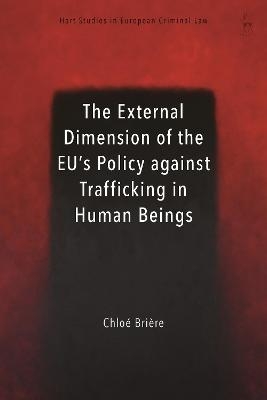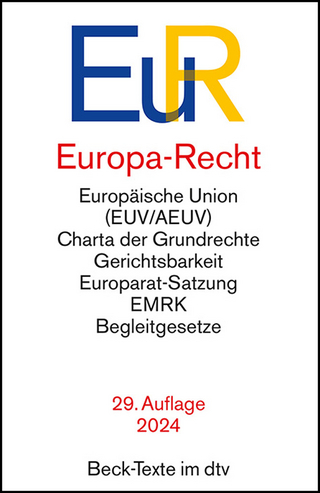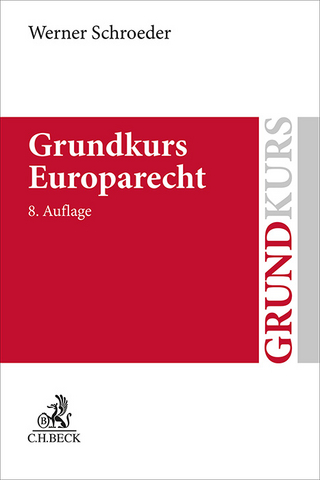
The External Dimension of the EU’s Policy against Trafficking in Human Beings
Hart Publishing (Verlag)
978-1-5099-4721-8 (ISBN)
Analysing the unilateral and multilateral mechanisms the EU uses to achieve these aims, the book questions whether the EU’s external response to human trafficking addresses it in all its dimensions, and whether it does so in a coherent way. As a case study, the book explores the cooperation of the EU with countries of the Western Balkans, which constitutes a specific unilateral mechanism. The analysis of the multilateral mechanisms covers the cooperation of the EU with key international and regional organisations combating human trafficking, including but not limited to the Council of Europe or the United Nations Office on Drugs and Crime.
The book also examines the impact of the evolution of migration flows and the increasing reliance of military tools on the EU’s response to human trafficking.
Chloé Brière is a Post-doctoral Research Fellow funded by the Belgian National Research Fund (FNRS) and a professor of EU law at the Centre for European Law of the Université libre de Bruxelles.
Introduction: Setting the Scene
I. Trafficking in Human Beings: A Global Challenge Impacting the EU
A. Trafficking in Human Beings as a Global Challenge
B. Trafficking in Human Beings as a Challenge for the EU
II. Definition of Key Concepts
A. Definition of Trafficking in Human Beings
B. The EU’s Approach to Combating Trafficking in Human Beings
C. The External Dimension of the EU’s Policy against Trafficking
III. How to Analyse the External Dimension of the EU’s Policy against Trafficking
IV. Structure of the Book
1. Framing the EU’s Policy and its External Competences
I. Introduction
II. The Identification of the Core Components of the EU’s Policy
A. What is the Acquis? Presentation of a Concept
B. What is the Acquis in the Field of the Prevention and Fight against Trafficking in Human Beings?
C. Conclusions
III. External Competences at the Disposal of the EU
A. Specificities of the Union’s External Competences Linked to the Area of Freedom, Security and Justice
B. The Union’s Relevant Express Competences
C. The Union’s Relevant Implied Competences
D. Constitutional Principles Guiding the EU’s External Counter-Trafficking Activities
E. Conclusions
IV. Conclusions on the EU’s Policy against Trafficking in Human Beings and its External Competences
2. Unilateral Promotion of the EU’s Policy: Case Study of the Western Balkans
I. Selection of the Case Study
A. The Desire of the EU to Establish Close Cooperation in the Fight against Crime
B. The SAP with the Western Balkans as the Selected Case Study
II. Promotion of the Fight against Trafficking Via Soft Law
III. Promotion of the Fight against Trafficking Via the Conclusion of Agreements
A. Association Agreements
B. Agreements with EU JHA Agencies
C. Agreements Concluded by the EU Member States
D. Conclusion
IV. The Support of Regional Cooperation
A. Regional Initiatives Promoting Police Cooperation
B. Regional Initiatives Promoting Judicial Cooperation
C. Regional Cooperation Among National Anti-Trafficking Coordinators
D. Regional Cooperation as a Preparation for Accession
V. Conclusions
3. Multilateral Promotion of the EU’s Policy
I. Introduction
II. The EU’s Commitment to Multilateralism
III. Institutional Multilateralism: Identification of Relevant Actors
A. Traditional Multilateral Actors: International and Regional Intergovernmental Organisations
B. Non-Traditional Multilateral Actors: Private Actors
C. A Tapestry Incomplete without Mentioning States
D. Conclusion
IV. Normative Interactions: The EU as a Norm-Taker or a Norm-Setter?
A. Interactions Leading to a Common Approach and Objectives
B. Consensus About the Objectives to be Pursued
C. Interactions Leading to Consistent Standards
D. Conclusion
V. Multilateralism in Action: Coordination Mechanisms to Avoid Duplication of Efforts
A. Internal Coordination Mechanisms in Large Organisations
B. Bilateral and Multilateral Mechanisms Among Partners
C. Importance of the Coordination and Cooperation Efforts
VI. Conclusion
4. Limits of the EU’s Actions and Future Avenues for Research
I. Addressing Trafficking in the Framework of a Renewed EU Migration Policy
II. Militarisation of the Response to Trafficking in Human Beings
A. The Mobilisation of CFSP Competences
B. Trafficking in Armed Conflicts
III. Conclusion
A. Is the EU’s Response Coherent?
B. Is the EU’s Response Comprehensive?
C. The Accountability Gaps
| Erscheinungsdatum | 08.04.2021 |
|---|---|
| Reihe/Serie | Hart Studies in European Criminal Law |
| Verlagsort | Oxford |
| Sprache | englisch |
| Maße | 156 x 234 mm |
| Themenwelt | Recht / Steuern ► EU / Internationales Recht |
| Recht / Steuern ► Strafrecht | |
| ISBN-10 | 1-5099-4721-3 / 1509947213 |
| ISBN-13 | 978-1-5099-4721-8 / 9781509947218 |
| Zustand | Neuware |
| Haben Sie eine Frage zum Produkt? |
aus dem Bereich


